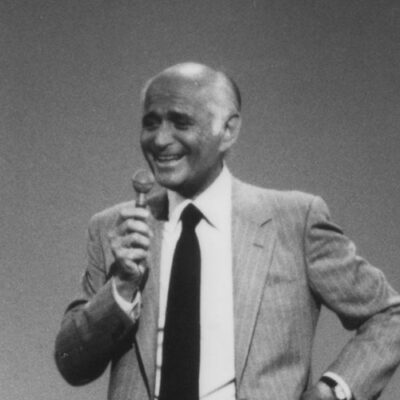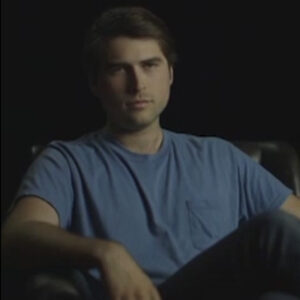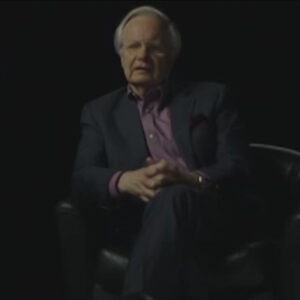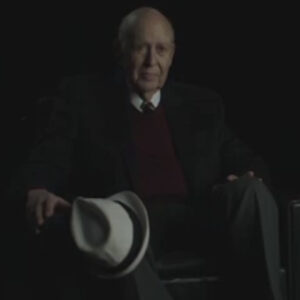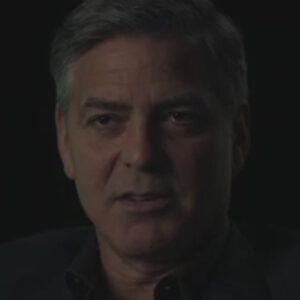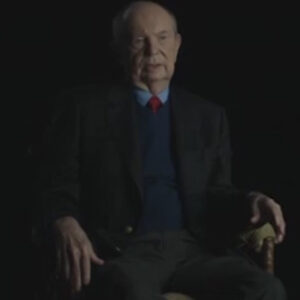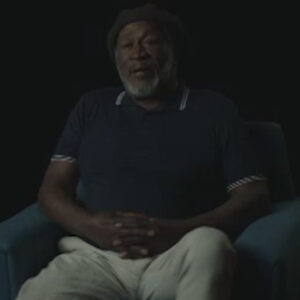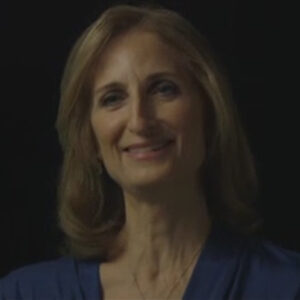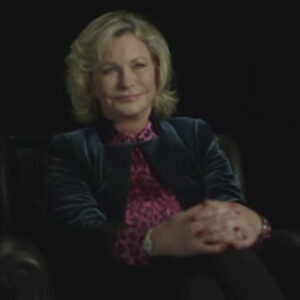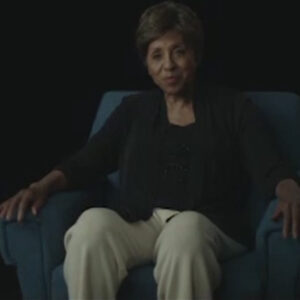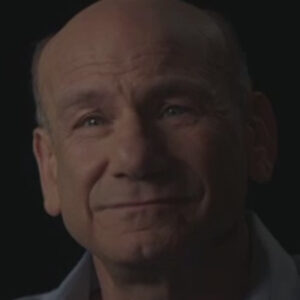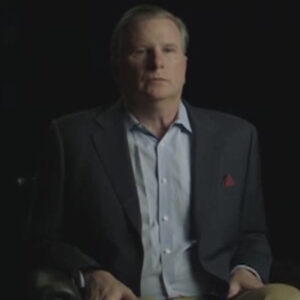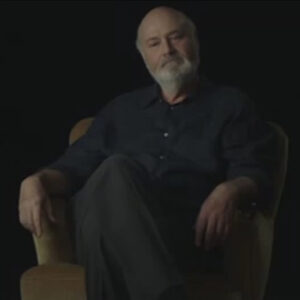Speaker It was about I’d been in Hollywood about two years when I met Norman, but I came from Oklahoma, graduated from the University of Tulsa, got in my Volkswagen three days later, asked my dad how to get to the Turner Turnpike, his face white and set off with my friend to come down to L.A. didn’t know anyone. Had a lead on a job at CBS and I got a job as a clerk typist in music clearance, which which served me well later. Got a job as a clerk typist in music clearance, which served me well later and met Tim Conway, worked for him and his comedy Hour.
Speaker David Steinberg went to Channel 11. An independent studio was head of promotion, which was insane because I’d never been in promotion before. They mostly ran reruns and associate produced a children’s show and got into a dog suit for the actual show every day. I did. That was another temporary job I had. And then I came back to CBS and heard through friends that work for Merv Griffin and Carol Burnett Show, et cetera, that Norman Lear was looking for someone on a new show. And that show was modde. It was nineteen seventy two.
Speaker I got the job, I worked for the head writers, the Scheller and Wisecup, Bob’s Bob Schiller, Bob Weiskopf. And our office was three desks away from where Norman’s office was and the head writers of all in the family. It was an incredible job.
Speaker It was my graduate school, it was a twenty four hour a day, seven days a week job, but I worked with every draft of every script with the writers. Would you. What were you doing? I was typing the scripts and I was not a good typist, I must say. But I was learning so much about structure and shaping stories. And I was in every note session with Norman and the writers. I was in every draft session. Then I began when the script went down to the set and the actors put it on its feet and they began working with the dialogue. Then there was another whole set of many, many, many rewrites and the script supervisor, Barbara Gallagher, and I would then retype every draft and we were in the notes sessions with the directors and Norman. And so I saw a line that may not have been funny and a read through. They would give the actors a new attitude or direction and it suddenly became hilarious. So I learned so much about acting as well. Barbara and I would work all night on the retyping with all the changes. Sometimes they would throw out three or four lines for changes and never really decide on one. And Barbara and I would go, Oh, we think the rhythm of that one is much better. So we just put that one in. No one ever said a word, really. People were delirious. They were so tired because there was so many drafts every day, constantly.
Speaker This is just Vermont. This is just Vermont. So one day, my friend Paddy Weaver, who I worked with at K.J. when I was the dog. Came to lunch and we used to sing together a lot. She was a great singer and we’d harmonize together and I was also studying, acting and working on comedy writing. And I had written for fun because I used to love watching the Miss America pageant back in those days. This because I thought it was hilarious. And I was working on a sketch comedy sketch about a Miss America contestant, probably Miss Oklahoma or Miss Texas, whose talent was an original oration on democracy versus communism. And she also had a song. If communism comes knocking at your door, don’t answer it as part of her talent. So I taught this song to Patti. We went across the street for lunch and we’re singing it in the parking lot on the way back up to CBS in our offices and Bernie West and Mickey Ross, who were head writers on the All in the Family, heard us in the parking lot and said, what are you singing? And I said, Oh, it’s this thing I wrote last night. And so they told Norman about it, I guess. And by the time I got back to the office and a little bit and Patti hung around a minute, Norman comes up and said. What was I hear you were singing a song that I might like, would you sing it for me? And of course. Panic was so what? And so we sang it for him and he said then at that moment, would you like to be on All in the Family and sing this song? And of course, that was the number one rated show in the country. The very notion that he should invite us at that moment to be on All in the Family was the most unbelievable gift a person could ever get and the most thrilling question. And I just could not believe it, and sure enough, I don’t know, a month later, we were on an episode of All in the Family, and that was the most generous and it was the most extraordinary thing. And that was my big intro into knowing Norman Lear.
Speaker So that story instantly brings up two things to me just in that little story.
Speaker The first one is and this is a this is a story we’re seeing over and over or we’re hearing over people, which is Norman giving people their first chance.
Speaker Unbelievable.
Speaker What where do you think that comes from? How does he know? How does he see something that other people don’t?
Speaker I have no idea how he knows, but he is his inclusiveness and generosity. Even in in the note sessions with the actors and the directors, I mean, we were obviously there to do a job, but if I had a question or I wanted to know more about something, which I always did, he was so generous, he would completely.
Speaker And you never felt like you were talking to God or the master or he didn’t try to create this.
Speaker Situation or attitude on the set where, you know, there was this hierarchy that you had to go through or anything, it was so open and inclusive and everybody felt like they were a part of the company and that what they did mattered. And so you felt really comfortable to ask questions and learn as much as you could. And that atmosphere was always present. And it was so helpful and exciting and creative and creative. And I learned so much because of it. But yes.
Speaker But I mean, who who does that? Who says to a writer secretary. It wasn’t even an assistant back then. It was a secretary.
Speaker How would you like to be on the number one rated show? He didn’t say that, but it was the number one rated show. How would you like to be an all in the family and sing your song?
Speaker But you know, what’s interesting is and I’m not saying this in a bad way, it’s not altruistic. He’s like she’s got something to offer me, you know what I’m saying? Like, he he he sees this as everyone’s got something to gain from recognizing talent, you know? So it’s not just like I think he’s smart. I think is a smart I think it’s a smart thing. And it’s an attitude that sometimes. Gets neglected, which is we all rise together.
Speaker We all rise together, he gave so many people opportunities. And again, when I did Mary Hartman, there was a part of that Jebali Scott played of Kathy, Mary Hartman sister. That’s what they originally came to me about. That part I saw Loretta and I wanted nothing but Loretta because she got to sing. She got to write crazy songs. It just seemed perfect. But they had already offered that to someone. And also it was a much it was a very intense part. And I didn’t have that much on camera acting experience. So for them to give it to someone like me seemed a little risky to leap. It was a leap. And yet and so I had to work with Joan Darling, who was the director and had an acting class, and she was going to determine if she thought I can handle the pressure and all that. But again, the openness, the willingness to say, really, OK, let me think about that.
Speaker I feel like the director in this book. I feel like Joan. He also.
Speaker Just said, you’re perfect for that. That’s right. Totally out of the blue. That is correct.
Speaker And she was perfect.
Speaker But isn’t that amazing? It’s still impossible for women to get directing kids.
Speaker Yeah, I mean, yeah, well, let’s leave now hit on another subject, women. Norman was the most inclusive man when it came to hiring women writers, women directors, women for anything, he was a part of the equal rights era movement, the women’s movement. His wife, Frances, was very active in that. And and he just was way ahead of everyone else at that period in promoting and using women in any way he could for production and jobs and acting and all kinds of help that he needed.
Speaker But again, I feel like it’s because.
Speaker He wants to use the best people, it’s like, but he saw something, you’re right, he saw something in people that clearly no one else had seen. I mean, no one else was offering Joan Darling a directing gig. And he would take a leap of faith, whereas other people you had to show them, I did this job, in this job, in this job, and I have this credit in this credit, you didn’t need that with Norman. If he saw something and he thought you could do it, he gave you the shot.
Speaker He he took risks. Yeah, right. So I’ve been revisiting some of the Mary Hartman Mary Hartman shows, which I have to admit, when I watched my mom love, love, love, loved it and thought it was funny showing the whole world.
Speaker And I would watch it and I’d be like. Got it.
Speaker And now, how old were you? I was little. I was like eight, seven. Well, of course, you know, I just I honestly did not get it.
Speaker I was like, unless you were a Martian, you would not have gotten into that kind of I remember unless you were a Martian, you would have not gotten there. Certain Martian households were maybe an eight year old would have gone.
Speaker How did you guys know at the time that you were working on the weirdest thing in the whole world?
Speaker Yes. Couldn’t have been more thrilled. I mean, I read the pilot and I went, woo, this is it. This is it. I mean, I remember my heart pounding, jumping up and down, going, OK, if I can work my way into this thing, they call me. Oh, I hope it happens. I, I mean, I wrote there were lyrics to a song for Loretta and the script with no music. I immediately made up a tune I could not stop working on Loretta part, even though I was supposed to be auditioning for the Kathee part. And then I wrote a couple other songs that Loretta writes. I mean, I just went off on it and yes, I thought it was, but I hadn’t met Louise yet, so I didn’t know that the genius of all time to play Mary Hartman was going to be in the cast. I had no idea.
Speaker So why what were you so excited about?
Speaker Was it just this part which was so perfect for, you know, the script, the whole notion of it which developed over time? The tone developed over time, but there was a hint of that tone. In the script and there was a hint of this insanity, but yet stuff that was happening in the culture that time, things that were in the news, things that you knew were true but had never been presented in precisely this way. And again, I think it was all about the tone that was established. Part of the creative part of what made the tone was Louise Lasser, her her essence delivery, her and her genius. I really think she was a genius in that part. She had so many levels and layers working simultaneously and her point of view as a person.
Speaker Then.
Speaker Just the way she used that to for Mary Hartman, which was not Lui’s, but in some other way was Louise. I mean, Louise is very intelligent and she just somehow melded this into this character in a way that was no one else could have done that.
Speaker So just.
Speaker For for our audience out there that doesn’t know everything about it. Tell me about real quick the format of the show and why it was a total novelty in this way.
Speaker Mary Hartman used the soap opera style of shooting, we did thirty five pages a day, five days a week. It’s insane. That’s an insult. I mean, they do thirty five pages on Martin on the family in a week, they take one week to do that. We took one morning to figure it out and then shot in the afternoon. So that alone was insanity. It was insanity for the writers, for the production crew, for the actors, for everyone. It was nuts. I would say the person who cleaned out the bathrooms also had a little breakdown up to the end of that run. It was just nuts. How many did you do? Three hundred and twenty five. And then Louise left and we did another hundred and something as forever Fernwood. So it was very intense, I remember reading something where the soap opera people were offended that we had copied their format and they thought we were making fun of soap operas, but we really weren’t. We were just using that formula and then tweaking it in a totally different way. And so it became its own animal. It had nothing to do. And it was it was what I consider to be the forerunner of a cable show. It was not a network show. It was never going to be a network show. Norman and Tandem in the writers had, you know, a great deal of trouble with program practices over a lot of things on and all in the family and all of his shows. But this was off the charts. What we were talking about, they have problems. Well, the networks, you that would have been a full time. It was already a full time job on and all in the family to keep up with the practices and the back and forth. But this would have been off the charts. So and they did not by which never surprise me. I always that was the part I don’t know how this is going to get on because there were no cables, shows and cable stations back then. So Norman created this first run syndication market and they played on all the independent stations across the country, which to me was the forerunner of cable TV and that whole notion that you could have you didn’t have network standards and practices telling you that you couldn’t say certain things that had never happened before.
Speaker Never. And that.
Speaker A show like Mary Hartman had never there was no first run syndication market, there were no cable. So a show like this had never existed like Mary Harmon before. Later, the network had a version of it called soap, and it was basically a rip off of our show, no offense. So no offense, but it was it was the network version of our show. I never saw soap. I know it was supposed to be funny because I was doing nine million things and we didn’t have the DVR back. So if you weren’t there, you didn’t see it. So I’m not putting soap down. I know there are many fans. In fact, I have a lot of people that come up to me today that think I was. So they get their little wires crossed a little bit and I go, no, it was the other one, the weirder one, Mary Hartman.
Speaker But maybe soap was weird. I don’t know. I’m sure it was a great show. I never got to see it. But the network did their version.
Speaker But we were the first one, Larry Hagman was weird.
Speaker Yeah, was it because you saw so OK, so it was weird, but you’re weird. Yeah. Um. So and also, have you read his book?
Speaker Yes, he describes in his book the breakthrough he had of having someone type during these bring, you know, these rights a meeting. So it’s funny, you are the person that was doing it.
Speaker Well, he was on All in the family full time and would go back and forth between MOD. So I didn’t I was not that person. He had his own personal assistant. But when they were in a notes session and he was doing that, yes, we were madly writing. Barbara and I are just me madly. And I did not take shorthand because as I said, I was not a full fledged secretary.
Speaker But that was your job.
Speaker Yet that was my job. Yes.
Speaker Bless their hearts, they didn’t get the full package in the secretarial scope, what are I am sure it’s overwhelming to think about. But since you did. Four hundred and fifty episodes of water, some that stick out in your mind as well, you’re doing it. You were like, this is insane.
Speaker Well, there are so many, the obvious iconic ones, Coach Vedder’s drowning in the chicken soup and the funeral that followed in Mary’s kitchen.
Speaker I, of course, enjoyed very much the Dinah Shore show and Loretta’s big shocking.
Speaker Statement that she made, which she was totally oblivious to, the Reverend Jimmy Jeter and Merle Jeter, played by Dabney Coleman, about the fundamentalist Christians and about that, because that’s something.
Speaker I can hear Norman being he’s so ahead of the curve in terms of those types of you.
Speaker Well, that was the period when there were a lot of. Christian television shows and there was Jerry Falwell, there was the Moral Majority, Pat Robertson’s broadcasting network and. Jimmy Swaggart, there were a lot of people at that time, and so I think this was came directly was inspired by that group of people and and he’s eight years old. The Reverend Jimmy Jo Jeter and his father’s is Merle Jeter. And they come to town and they. They have a whole arc story arc with Loretta and they’re asking her to help them with build condos for Christ and. And they have a whole they have the one voice choir and they have all kinds of things, and Loretta begins devoting all of her time, almost excluding her road to superstardom with this group and the condos for Christ. So anyway, but little Reverend Jimmy Joe ultimately gets electrocuted. He’s watching TV in the bathtub and something happens anyway. He gets electrocuted. So there are I can’t even think about the other ones, but there is. But the whole Jimmy Jeter world Jeter thing I absolutely loved. It was so fun to work with Dabney. And I loved I loved the story of Mary and Tom and how it grew and developed and their scenes together. I just thought they were as dramatic scenes, some of the best ever and and then so funny and so unbelievably moving and real about a marriage and the ups and downs of a marriage and separation and affairs. And I loved Mary and Sargent Foley. I thought that was tender and hilarious and. And moving at times and of course, Mary’s breakdown at the end of the first season, which is as brilliant a piece of acting as exists, it’s just amazing. The thing about Mary Hartman, I think, is that you can’t you might just see a scene here, a scene there, but it needs context. It’s very hard to get the tone and the whole situation if you don’t see the big picture and then you see all these tiny moments that are so funny. But they’re not big jokes, but it’s in the context of the story and the scene. So it’s I think it’s more little interesting, truthful and or hilarious. Attitude moments on all the parts of the it’s a different scenario, yes.
Speaker Yeah.
Speaker Did people come out? Did the fundamentalists come after the program?
Speaker Did you know? I guess I’m sure they did. But back then, we didn’t have cable news. We didn’t have twenty four hour bombardment of, you know, the same news story played over and over and over and over and over. We didn’t have a deadline. I mean, we didn’t have all that stuff that we have now, so. I didn’t I mean, they said they weren’t going to show the episodes in certain towns, it was family viewing hour, but sometimes it was 11 o’clock at night. No, they didn’t want it then either. There were a lot of protests. But when we do our shows started beating the newscasts that were opposite, it kind of changed their tune because they did want that revenue from those commercial sales time slots for commercials. So, yes, there were people that said it was outrageous, it was horrible. Many of them had never seen it. There was some. But I don’t know about Jimmy Swaggart or those particular people if they.
Speaker They hated Norment. I know that. Yes, I’m sure they did. The show covered a lot of real serious stuff as Ryazan, but.
Speaker It also was definitely a commentary on consumerism, on American values. You know. In a way, just. How America may be to this day was falling short, how its so many, it was doing so many things. Do you did you did you guys talk about the fact that you do agree with that? And if so, how conscious were you guys of, you know, sort of this ongoing commentary that was going on.
Speaker Well, I think maybe not everybody, but I think most of the actors were conscious of what we were doing, what we were talking about, how we were mirroring in an exaggerated way certain things that were going on in the culture at that time. I mean, consumerism and the media. And that certainly has not changed. I would say it’s gotten a million times worse because now we have so many outlets to receive more information. We only had television and radio back then. Now we’ve got computers and 24 hour news cables and, you know, damn podcasts. And I mean, there’s so much even more coming at us now. So that’s why I think this show still holds up, because we still have the same issues.
Speaker But no one really was addressing these issues as much as Norman Lear was and starting with All in the Family. You know, The Mary Tyler Moore Show, which I was devoted to as well, was very inspiring about women having their own lives in their own careers and not being a nurse or a school teacher, but actually doing something on their own and maybe not getting married. That had never happened before. But Norman took social issues and family issues and. Talked about them in a way that, you know, Green Acres in The Beverly Hillbillies did not. And it was exciting. It was exciting. And it was also funny because we could laugh at ourselves. And and the thing about Mary Hartman that always blew my mind when I would go around the country with my record and with four press four. Mary Hartman, was that an intellectual in New York and a pig farmer in South Carolina were equally invested in the show. Who knows what the reasons were? I don’t think they were the same reasons. I would guess they were not the same reasons, but the fact that they were both equally devoted to watching the show said something to me about what we were talking about. There were poor people, wealthy people, middle of the country, coast people. It was it was a crossover on every level. And I was really blown away by that. It wasn’t just for a certain group. And I even think there were conservative people that watched it.
Speaker What a great. Entree to. The field you’re in, I mean, it was such a gift and a blessing.
Speaker There’s no other way to describe it. And it brought me to a different consciousness. It raised my consciousness about so many things, political things, psychological things, spiritual things. It was a great school for me on so many. All of my experiences with Norman have been like going to school, but the best fun most of us fit in.
Speaker I’m going to have you let me just throw some add something in there about the very heart, and you mentioned it was a meditation on consumerism. Could you also address sort of what what it was saying about feminism and womanhood and housewifery and all that stuff?
Speaker Well, I tell Rachael.
Speaker OK, and we can also. That’s right. Because Modde is such a. Counter to that, right?
Speaker Well, you had Jean Stapleton and Carroll O’Connor in All in the family, and she was more on the surface, submissive wife and he was the king of the family. And but in her beautiful, subtle way, Jean Stapleton also held her own with Archie. I mean, she knew how to. Handle him, and she also knew when she had to assert herself in whatever subtle and lovely way she managed to do it, then we go from that kind of marriage to Maude, who’s the strongest woman we’ve seen on television, I think to that point, and maybe still so and the woman’s movement was, you know, developing at this time. And it was a really confusing time to a lot of people. It was an exciting time for a lot of women. And Norman was one of the few men that I ever met that was on the on board for all of that and excited about it and investigating it and telling stories about it. And of course, it was thrilling and I think it was thrilling. I remember once I went to a retreat. In a monastery to write and no talking, and they had this library, it was up in Northern California and there were all these books from the forties, short story collections from the 30s and 40s, and all the stories about women in these books. They were all depressed, they were all married and, you know, big successful marriages with, you know, well-to-do marriages, many of them sophisticated and the East Coast. But all of them had not found themselves and were depressed and felt less than they they hadn’t found their voice yet. And it was so interesting to read these stories during this period and then see how much had changed and what was going on at this time with shows like Maude and Mary Tyler Moore Show and all these shows that celebrated women and this new possibility for all of us at that time.
Speaker That’s actually the abortion episode, right?
Speaker Yes, of course. That was Susan Harris. Right. Susan Harris wrote that I believe the writer.
Speaker That’s how we we interviewed Norman Moore, a show that we did on Women in comedy, because that’s such a famous epic. Yes. Yes. What were you working on the show then? Yes. Can you tell us a little bit about it? Because it’s still to this day, I think I was working on the show.
Speaker It was that the first season, because I was only there the first season that might have been in the second season, I’m not sure. But I remember. But I know the show I saw it was two parts, if I’m not mistaken. And it was an incredible show because here were all these people across the country going through a situation of some kind that involved this topic.
Speaker And no one, you could read clinical things about it in a magazine or something, but to see it.
Speaker In a story on television was shocking and also, I think, really helpful to a lot of people, too, to have something to connect to, a story to connect to and and for the issues to be acknowledged, the struggle to be acknowledged and making decisions of that kind.
Speaker But it was a comedy.
Speaker That’s the best part about it, because it’s too you have to be able to laugh in these, you know, you can’t it’s that’s a better way to receive a story. And also, let’s face it, doing during our darkest times, we often the most hilarious or insane things happen.
Speaker And you have to laugh at gallows humor.
Speaker But it’s not it may not even be gallows humor, it can just be. The humanity of yourself, humor, I mean, just what an idiot I am, or can you believe this thing happened when I, you know, just these incidences in life that are funny, really funny at the worst possible time.
Speaker I am going to have you read a couple paragraphs from this and then, OK, we move on. Are you still in touch with police?
Speaker Yes, I’ve talked to her, I talked I mean, not every month, but I’ve definitely talked to her in recent years. And I called her after girls because I love girls because she was doing that one.
Speaker That is it big enough. Yeah. Comfortable to read. And then I’m going to find. OK, and then this one to you, this is a good one, too. OK, stop one. A man, oh, no hero and action, a man dies in his chicken soup, a cop with bedroom eyes, scores like Errol Flynn.
Speaker The heroine is a boring nitwit of giant proportions, her best friend Bombs on the Dinah Shore show. Anything is liable to pop up on Norman Lear syndicated evening soap opera. So Mary Hartman, Mary Hartman becomes the season’s most talked about entry. OK, that was that was good a little and you want me to try it again, a little more casual look and look at me, OK?
Speaker Oh, yeah, OK.
Speaker A man dies in his chicken soup, a cop with bedroom eyes, scores like Errol Flynn, the heroine is a boring nitwit of giant proportions. Her best friend Bombs on Dinah Shore show anything is like starting in.
Speaker This could go on forever.
Speaker A man dies in his chicken soup, a cop with bedroom eyes, scores like Errol Flynn, the heroine is a boring nitwit of gigantic proportions. Her best friend, Bombs on Dinah Shore show anything is likeable. Now, what is my problem? It’s liable. Anything one more time. A man dies in his chicken soup, a cop with bedroom eyes, scores like Errol Flynn, the heroine is a boring nitwit of gigantic proportions. Her best friend, Bombs on Dinah Shore show anything is liable to pop up on Norman Lear syndicated evening soap opera. So Mary Hartman, Mary Hartman becomes the season’s most talked about entry.
Speaker Oh, the.
Speaker Oh, dear.
Speaker When Mary Kay Place, a young writer of such sophisticated shows as MASH, The Mary Tyler Moore Show, Maude, Phyllis and Rhoda with partner Linda Bloodworth. Read the Mary Hartman script. It blew her mind.
Speaker The writer knew she had to be a part of the show, so true.
Speaker I like that he stuck with you, stuck with your story, because he’s put it down. OK, um. All right, let’s see, um.
Speaker Let’s talk about so did you watch did you watch all the family when you were before you?
Speaker Oh, yes, definitely. Definitely.
Speaker Well, I definitely watched All in the family. Loved it. I can’t remember what night was it on the same night as Mary Tyler Moore, because there was a Saturday night, literally. I didn’t want to go out on Saturday night. I wanted to be in someone’s home for dinner or whatever. We had to be watching TV on Saturday night. And I was certainly in my own home on Saturday nights. Couldn’t wait for those shows. We would have people over. Sometimes I watch it by myself, but there was a whole run of shows and all in family, I believe was one of those nights, but may not have been, but I definitely watched it.
Speaker Were you on the West Coast already or were you back home?
Speaker No, no. I was in L.A. when that show came on the air.
Speaker Why were you so riveted?
Speaker Again, it was hilarious. It was about things that were happening in the country and it was about family. And I recognized some of those things. I mean, I think it was universal, even though it was so specific about Archie, who was so, you know, big. He was just not a bigamist. But he was just what you. Hello. Archie was a bigot. He was put everybody down. He didn’t understand anything. My father was not like that. But there were elements of Archie that I could relate to and I think every family could relate to.
Speaker Did you like him?
Speaker I loved him. You did? I adored him. I never got mad at him. I thought he was hysterical. I mean, we all know people like that. You know, I mean, I may not have liked him as much if he were my father, but to watch on television, I thought he was incredible. I thought he was the perfect way to talk about so many things.
Speaker Oh. Let’s talk about well, you know what is really interesting, Norman told us that the character that he most identifies with him is not. Yeah, I’ve heard him say that was kind of awesome because I think Modde said what she thought.
Speaker She was very direct. She had no problem stating her point of view. And I don’t think Norman I mean, Norman used characters to state his point of view and talk about things that nobody talked about. But I think he’s also very direct.
Speaker And.
Speaker I think he has a dry wit like mud, I think that, you know, he’s just very forthright in the same way. And it was his favorite way to say things because I think she cracked him up. And Bea Arthur, again, he always found the perfect actor, I just said this about Bea Arthur five minutes ago.
Speaker I don’t remember you saying, Oh, OK, good to go back. She’s another example.
Speaker So Bea Arthur is another example of him finding the perfect actor to inhabit these things he wanted to say about the country and about being human and about family. And and again, all of these shows were about family. And I also find that interesting when it can be such a specific family and yet be so universal, because I think people did relate to these people, even though their family could be very different.
Speaker Right. And he had seen her years before in a off Broadway show.
Speaker He always brought New York actors to L.A. and I had been to New York, maybe. Let’s see, I maybe been twice when I did Mary Hartman, when I did this job, I’d never been to New York when I was unmoored, never in my life. That’s a whole universe. I mean, you have to go there to start to even get it, you can’t just watch Jackie Gleason on TV and that girl and The Ed Sullivan Show, which is all I had to go on, and the Red Skull. I mean, you can’t just watch those shows and really get New York. You have to go there and live there and be there. And he was bringing these people that I had never seen on Broadway or knew about, really, and they were these incredible actors. And that was another exciting thing that you got introduced to all these people you wouldn’t know about otherwise, because I don’t really think they were on TV that much.
Speaker You know, I think he he blended the article.
Speaker Yes.
Speaker You know, I mean, they were all Broadway performers, most of them. And you they were in theater, New York theater and all of his his shows like that.
Speaker Yes. They feel like three act plays. Yes, I feel that way.
Speaker I see a lot of stuff.
Speaker How about.
Speaker Activism him as an activist and his. His you know, the platform that he created for himself to sort of beam into people’s. Personal space and make them think about stuff, have you you’ve you’ve now you’ve been in Hollywood for years.
Speaker Does this activism. Is this something that can flourish here? Is this is this something you see as a you know, this is a quality that’s typical?
Speaker And how much does Norman have to do with that or not? Well.
Speaker Norman, I think, is has been at the forefront of activism in Los Angeles, definitely, and when he created people for the American way, but but he’s talked about a lot of things in a soft way through shows so that people just hear a story about it. And then he went, I think more specifically working on issues with people for the American way. And then also, I mean, at the point in his life when he didn’t work as much. And can we just talk about the fact that no one has ever done more work in their entire life? I mean, the amount the sheer volume of material that he has created is overwhelming to me. It is just unbelievable. And the life, the relentless work of his life, maintaining his family life, his political life and his work life. To me, I have a breakdown. Thinking about it, I would not be capable.
Speaker Not even a hair of that decided to create a show that required four hundred episodes in two years. That’s crazy. He signed up for that.
Speaker But it’s not just that show. It’s every show that he had going. Just one. Yes, that was just one. So the sheer volume of energy and capacity he has for multitasking and accomplishing a lot of things, I that’s not in my DNA. I can’t even fathom it. The sheer energy and focus and time that he devotes to everything and has for all of these many years.
Speaker So when he backed off a little on the television production and then started People for the American Way, then bought the Constitution, I mean, Declaration of Independence and took it around the country, which was just such an amazing thing to me, to allow children and libraries and people to really see an original copy of this document and all that accompanied that. Again, it’s just unbelievable and. And he’s still at it, that’s the other thing that so but I think he’s inspired people. I think he’s helped a lot of. Issues gain acknowledgement and recognition and educate and has educated people about things.
Speaker So is there is there one there are there, Norman, leaders of our time now?
Speaker I don’t know of anyone. Not I mean, there’s no one that he’s a unique individual. Maybe there are people who there are activists for sure that do a lot of incredible work. Rob Reiner is one of them. But nobody there’s I don’t know of another Norman Lear DU.
Speaker Well, we interviewed Russell Simmons today. He’s going to try. Good for him. That’s fantastic. That’s fantastic. That’s why I moved here.
Speaker Really? Isn’t that cool? I hope it does.
Speaker Yeah, well, but, you know, he’s got a good role models, so and he’s just stated that he’s he’s got the energy and the passion to do it because it takes to me it’s a calling. It is absolutely a calling. You either have it or you don’t.
Speaker Will you sing one of those songs?
Speaker I think you have a beautiful neck.
Speaker What is it? If it’s not good, we won’t use it. Well, I know you said you wanted your voice to.
Speaker Yes, but I don’t I think if you’re going to use the song, you know, the real one would be we’ll have a different one because you would like because then you would have Carroll O’Connor’s face, which is why the song works, I think, because he’s like, no, we liked it.
Speaker Yeah, I want to be annoyed, but I agree with the lyrics. Well, yeah, that part’s when you would sing.
Speaker I can’t imagine another one being this is about Norman Lear, it’s not about my son. Are you mad at me?
Speaker Because I’m not saying that I’m mad, you really know, but just go ahead and do it.
Speaker But no, I mean, I did tell you I would sing it, and I don’t want to go back on my word.
Speaker But honestly, I think that clip is is much funnier way if you can get the rights to that clip. But like. Yeah. I don’t know. Will give us the right.
Speaker Well, but that was owned by tandem. That was my first published song, and I didn’t know to ask for my own. Again, I will do it if you but I really would think that would be the better.
Speaker OK.
Speaker Any other I’ve got a couple little follow up. So is there was did you did you have this moment on location, on the set and just answer all the questions on the set there just to make. But. Did you work with the basement apartment? Did you talk about what was on that show and how involved he was?
Speaker Well, Norman had so many shows going at the time of Mary Hartman that he was not on the set on a regular basis because he had too much to do. And we were at another location and then CBS at that time. So he would show up every now and then. But it was usually when there was a crisis of some sort or a big scene coming up. I think he was definitely involved in the Dinah Shore show, he was very excited about that one. You talked about that. And and so he showed up for that for sure.
Speaker And what kind of crises were happening? Do you remember? I mean, the network, like, don’t we don’t get this or no network or.
Speaker I mean. That’s right.
Speaker Know, we had free reign.
Speaker So what kind of crises or what kind of things do you remember happening?
Speaker It was just sheer exhaustion on the part of everyone we had. You can’t do that many shows. You can’t do that many pages, five days a week. People are falling apart, far exhausted. And so and we were learning, you know, 12, 15, 20 pages of dialogue. I was like writing songs, really. I mean, it was crazy. And I just think it was what happens in that situation when you’re doing that insane volume of work. People got tired, they got sensitive, they got you know, but so it can be crazy at times. But it was always fun. Always fun.
Speaker How do you feel when it ended? What was the feeling that you had the rest of.
Speaker I felt completely grateful to have been part of such a unique and exciting show. It will I will never forget it as long as I live. I was also fried like a burnt piece of chicken. I was completely fried to the nth degree. I was worn out because, of course. Not only the incredible schedule we were on, but then because the show was so hot and and big, I was offered, as was everyone else, all these men, you know, Martin Scorsese film, New York, New York. I was doing an album. I was on the road promoting the show. It was nuts. And so I was really quite.
Speaker I actually had depression after because it was the only way I was going to slow my body down. I wouldn’t stop. I didn’t know I had I didn’t understand how to restore myself and take care of myself. It was my first big lesson that I could not go forever. However, Norman apparently could.
Speaker It’s incredible. So I was sorry, by the way, so the box that came out like a year ago, a couple of years ago.
Speaker Right. And a bunch of my friends discovered it like crazy people and they’re obsessed with it.
Speaker Is there something about that? I feel like it was ahead of its time, in a strange way. If you thought about that or.
Speaker Oh, I totally thought it was ahead of its time. It was it was. I divide the world into civilians and Martians. Our family, my family looked like a civilian family, but it was definitely a Martian family and I have a feeling most of us might have come from Mars as well. I think most people in show business are Martians. We are not mainstream people. For the most part. This was definitely a Martian show, and so in that way, it was way ahead of its time. That’s why soap came later. Because it was like our show, but it was we Norman created it and it was nothing, there was nothing like it.
Speaker And and and Twin Peaks later was a Martian show in in the same in a different way. But it was also a Martian show. So that would be the.
Speaker First thing that showed up after Mary Hartman, that made me think, OK, this is its own animal. There’s nothing like it.
Speaker So does that mean for all of us and the crew and everything, we take off our human costumes because we have to fix it?
Speaker No, I think I think now there’s a mix involved now that I’m older and, you know, studied a little more psychology. I think there’s a mix involved. But I think, you know, the main essence is Martien.
Speaker Last thing I want to just ask about the dinosaur, because we definitely I we want to use that material, but just some context for it. Tell me how that came to be. It’s so.
Speaker Special in that episode. Yeah, well, Norman came, I just remember, right? I mean, literally, like the day or two before we did it, because mainly the focus that I knew about was I I was going to sing Baby Boy on the Dinah Shore show, and this was going to be the start of Loretta’s career. And I didn’t know I was going to say any outrageous, disrespectful thing. And so.
Speaker Norman comes, he’s so excited, he goes, wait till you see what’s going to happen, and I thought it was about the song and I thought, OK, and then he gave me the script and he was as excited. He was like a kid in a candy store. He was so excited about that. He had written it. Yes, I think he wrote that part. Now, I could be wrong about that. You should ask, but I’m pretty sure it was his idea.
Speaker He was beside himself and she didn’t she didn’t know or why was he so excited just because it was so subversive?
Speaker Yes, I think it was just. A wonderful moment for Loretta and and I thought it was a wonderful moment for a character’s total lack of understanding, I mean, of all people to say that it was clear Loretta did not have a mean bone in her body.
Speaker And was it a surprise to had she read the script?
Speaker I have no idea. OK, I have a feeling she probably read the script because I mean that even though it look like the Dinah Shore show and I think we shot it at the end of her show, but I don’t think there was a live audience. So I’m sure she Dinah had access to that beforehand, but she definitely loved it, too.
Speaker I mean, she she did a good job. Yeah, it’s awesome. It’s outrageous. It’s it’s all that. I’m finished. Good. Is there anything brand that comes to mind in here, Miss?
Speaker Very good if communism comes knocking at your door, don’t answer it, if communism comes in knocking at your Oh, I started I got to start over like I started to hire. If communism comes knocking at your door, don’t answer it, if communism comes knocking at your neighbor’s door.
Speaker Don’t let him answer it for democracy, the way to live each and every day. So if communism comes, just say you’re not at home.
Speaker Whoa, whoa, whoa. From democracy will never, ever roam.
Speaker We now. Yeah, could you could you explain that? I’m sorry, that should have ended and it was supposed to end.
Speaker I just because I think it’d be interesting, people would watch this film that your character explain how the album came about. Oh, yes. And that’s so wild. I’ve never heard of that. So OK.
Speaker So Loretta saying this was not a great singer saying all kind of ridiculous, insane songs that were so much fun to write, and some of the lyrics were in the script.
Speaker And I just wrote the music, some of the songs I made up for the whole thing. Baby Boy was an example vitamin. Well, anyway, I started my agent got a few calls. I think Atlantic Records was one of them and oh, a woman who was in a big female figure in the music business who had a small label. I’m so I should have looked this up. I forgot about this. Also had called, but I was afraid it was going to be like Laverne and Shirley sing the fifty sets and I just didn’t want to do a novelty record. And also on a number of levels, I didn’t really have any track record, so I said no. And then I got a call from Emmylou Harris, and I was a huge fan of Emmylou Harris and her producer, Brian Ahern, who later became her husband, but at that time they were not married and he produced and Murray and all these amazing artists and. They were doing an album and they called to see if I would like to do a record album, and that changed everything because she was illegitimate. She had sung with Gram Parsons and all these Willie Nelson and all these people. And I knew she was a real singer and I loved her work. And then I thought, oh, my God, this I could actually have an incredible, legitimate, authentic experience. For which I know that I’m terrified about that, and then I imagined being in the rest home in my 80s or 90s and with my little teeth and a glass by the bed, and I thought, you know, I should have done that Dern album. I should have because I loved to sing. And so I decided to jump off the bridge.
Speaker And it was terrifying and often I had hives and I was I hadn’t done my 10000 hours, and so I really it was hard, it was very hard, but it was the one of the I did three albums for Columbia Records.
Speaker It was so much fun. I got to work with unbelievable musicians, the finest all gathered for my albums through me and Brian. I met Willie Nelson, his band, all these incredible musicians, and Dolly Parton and singers of all, you know, just everybody. And they all many of them participated on this album. And it was the most thrilling, one of the most thrilling things besides doing the show that I ever got to do.
Speaker So you had your own spinoff.
Speaker Yes, I have this these three records and.
Speaker Well, I guess I don’t need to talk about that.
Speaker This you’re not going to put this in, but they asked me at the end if we wanted to do a spinoff for the network of Loretta. And I didn’t first of all, I was comatose, worn out, but I knew we wouldn’t have the freedom on network that we had had on the show, and I just felt like we had done it, you know, and it would be a watered down. I just felt like it was wrong. Just wasn’t right. Good letter, freak flag fly, you know, and at that time, I was not emotionally, physically or mentally rested enough to take on something like that. I was, like I said, fried as a corn fritter when there’s nothing on today that says the rituals that show.
Speaker Yeah, well, there’s some pretty good stuff on today, though, there’s different stuff, there’s nothing as Martien, but there’s a lot there’s nothing as Mary Harmon, there’s nothing as Martian as that. But there are some really good shows. I mean, I when I first saw girls, I just went, what in the hell is going on here? I was so excited. I just thought it was insane. Yeah, but there’s a lot of there’s a there’s a lot of good shows that have excited me, I have to say, in recent years different than this.
Speaker And we’re used to it now, but they don’t have political commentary. They don’t they’re edgy, but I don’t see the political commentary right.
Speaker You know what I’m saying? Like, yeah, there’s another level to what was happening, but we’re more we’re more used to political commentary now.
Speaker It was it wasn’t happening back then. And so it was more shocking and it was more exciting in a certain way. But I think we have a lot of political commentary in the atmosphere coming from a variety. We’ve got Belmarsh. I mean, there’s so many shows that deal with that Jon Stewart. I mean, all of that. So that it’s it’s out there. It’s just not.
Speaker And one sitcom or network show or one half hour show like it used to be because because we moved on to other because there’s a mutation’s. Yes.

